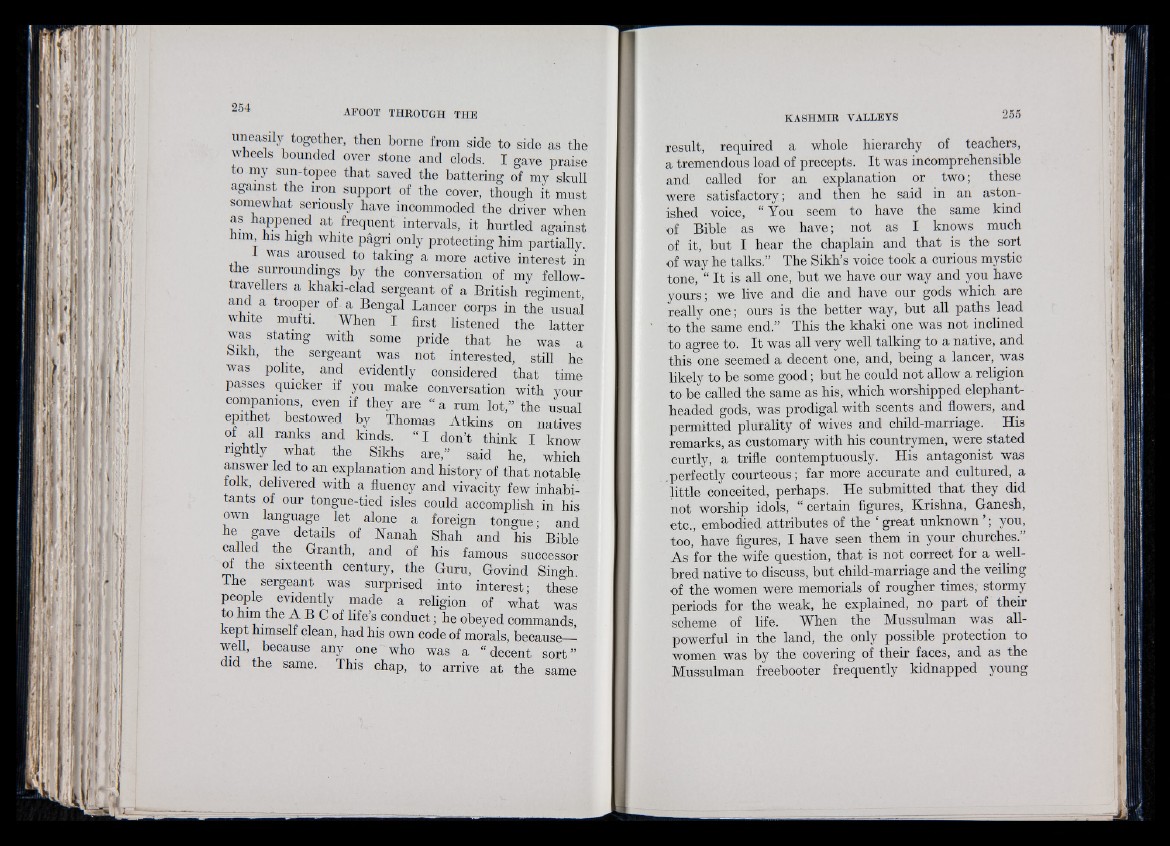
uneasily together, then borne from side to side as the
wheels bounded over stone and clods. I gave praise
to my sun-topee that saved the battering of my skull
against the iron support of the cover, though it must
somewhat seriously have incommoded the driver when
as happened at frequent intervals, it hurtled against
Aim his high white pagri only protecting him partially.
was aroused to taking a more active interest in
the surroundings by the conversation of my fellow-
travellers a khaki-clad sergeant of a British regiment,
and a trooper of a Bengal Lancer corps in the usual
white mufti. When I first listened the latter
was stating with some pride that he was a
bikh, the sergeant was not interested, still he
was polite, and evidently considered that time
passes quicker if you make conversation with your
companions, even if they are “ a rum lot,” the usual
epithet bestowed by Thomas Atkins on natives
o± all ranks and kinds. “ I don’t think I know
rightly what the Sikhs are,” said he, which
answer led to an explanation and history of that notable
folk, delivered with a fluency and vivacity few inhabitants
of our tongue-tied isles could accomplish in his
own language let alone a foreign tongue; and
he gave details of Na.nah Shah and his Bible
called the Granth, and of his famous successor
ot the sixteenth century, the Guru, Govind Singh,
lh e sergeant was surprised into interest; these
people evidently made a religion of what was
to him the A B C of life’s conduct; he obeyed commands
kept himself clean, had his own code of morals, because__
well, because any one who was a “ decent sort ”
did the same. This chap, to arrive at the same
result, required a whole hierarchy of teachers,
a tremendous load of precepts. I t was incomprehensible
and called for an explanation or two; these
were satisfactory; and then he said in an astonished
voice, “ You seem to have the same kind
of Bible as we have; not as I knows much
of it, but I hear the chaplain and that is the sort
of way he talks.” The Sikh’s voice took a curious mystic
tone, “ It is all one, but we have our way and you have
yours; we live and die and have our gods which are
really one; ours is the better way, but all paths lead
to the same end.” This the khaki one was not inclined
to agree to. I t was all very well talking to a native, and
this one seemed a decent one, and, being a lancer, was
likely to be some good; but he could not allow a religion
to be called the same as his, which worshipped elephantheaded
gods, was prodigal with scents and flowers, and
permitted plurality of wives and child-marriage. His
remarks, as customary with his countrymen, were stated
curtly, a trifle contemptuously. His antagonist was
.perfectly courteous; far more accurate and cultured, a
little conceited, perhaps. He submitted that they did
not worship idols, “ certain figures, Krishna, Ganesh,
etc., embodied attributes of the £ great unknown ’; you,
too, have figures, I have seen them in your churches.”
As for the wife question, that is not correct for a well-
bred native to discuss, but child-marriage and the veiling
of the women were memorials of rougher times, stormy
periods for the weak, he explained, no part of their
scheme of life. When the Mussulman was all-
powerful in the land, the only possible protection to
women was by the covering of their faces, and as the
Mussulman freebooter frequently kidnapped young